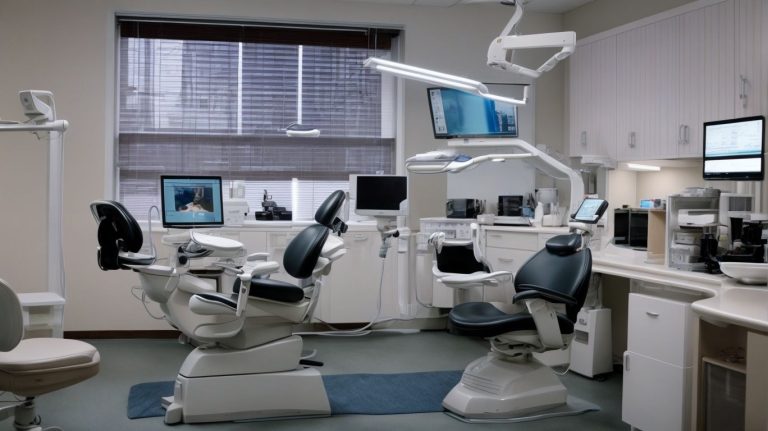Holistic Dentistry: Your Whole Body Is Affected By The Health Of Your Teeth

Holistic dentistry addresses the health of the body as affected by dental health. Oral health affects more than just your teeth. Your whole body is affected by the health of your teeth, gums, and jaw. Oral cancer is one example of a health condition that can be caused by or worsen with poor oral hygiene. Other conditions like gum disease or tooth decay can contribute to chronic pain or lead to infections that affect your heart and other major organs in your body.
Oral Cancer
Oral cancer is a serious disease that can have a profound impact on your overall health. While most cases of oral cancer are diagnosed in the later stages, there are early warning signs that you can look out for. If you experience any of the following symptoms, it’s important to see your dentist or doctor right away:
-A sore or irritation that doesn’t go away
-Bleeding in the mouth
-A lump or mass in the mouth or throat
-Difficulty swallowing
-Changes in voice or hoarseness
While these symptoms can be indicative of other conditions, it’s important to have them checked out by a medical professional. Oral cancer is often caused by exposure to harmful chemicals, such as tobacco smoke. If you use tobacco products, it’s important to quit as soon as possible to reduce your risk of developing oral cancer.
You can also reduce your risk by eating a healthy diet and maintaining good oral hygiene. Eating plenty of fruits and vegetables helps keep your immune system strong, while brushing and flossing regularly helps remove plaque and bacteria from your teeth and gums.If you’re concerned about your risk of developing oral cancer, talk to your dentist about what you can do to protect yourself.
The Mouth and the Whole Body
The mouth is the gateway to the body. What goes into the mouth can affect the whole body. That’s why holistic dentistry takes a whole-body approach to oral health.
Your teeth are more than just bones in your mouth. They’re living tissue that’s connected to the rest of your body by nerves and blood vessels. What happens in your mouth can affect your overall health, and vice versa.
For example, did you know that gum disease has been linked to heart disease, stroke, and other serious health conditions? Gum disease is an infection of the gums and bone that hold your teeth in place. It’s caused by plaque, a sticky film of bacteria that forms on your teeth. If plaque isn’t removed, it can harden into tartar, which can irritate and inflame the gums. This can lead to gingivitis, an early stage of gum disease. If left untreated, gingivitis can progress to periodontitis, a more serious form of gum disease that can damage the bone and connective tissue that support your teeth.
Gum disease has also been linked to other health problems such as heart disease, stroke, diabetes, respiratory illness, and even osteoporosis. That’s why it’s important to take care of your oral health so you can avoid these serious health problems down the road.
Risk Factors
There are many risk factors that can affect the health of your teeth. Some of these include:
- Poor oral hygiene: This is one of the most common risk factors for tooth decay and other dental problems. If you don’t brush and floss regularly, you’re more likely to develop cavities and other issues.
- Tobacco use: Smoking and chewing tobacco can cause a number of serious dental problems, including gum disease, tooth discoloration, and an increased risk for oral cancer.
- Eating disorders: Anorexia and bulimia can lead to serious tooth decay due to the acidic nature of vomit.
- Medications: Some medications (such as certain antibiotics and chemotherapy drugs) can cause dry mouth, which increases the risk for tooth decay.
- Genetics: You may be more likely to develop certain dental problems if they run in your family.
Gum Disease and Heart Disease
The link between gum disease and heart disease has been well-established by medical research. Gum disease is caused by bacteria in the mouth that form plaque and tartar on the teeth. These bacteria can enter the bloodstream and travel to the heart, where they can cause infection and inflammation. This increases the risk of heart disease and stroke.
While the connection between gum disease and heart disease is clear, the exact mechanisms are still being studied. It is believed that the inflammation caused by gum disease may contribute to atherosclerosis, or hardening of the arteries. This can lead to narrowing of the arteries and an increased risk of heart attack and stroke.
There are a few things you can do to reduce your risk of gum disease and heart disease. First, practice good oral hygiene by brushing your teeth twice a day and flossing daily. This will help remove plaque and bacteria from your teeth and gums. Second, see your dentist regularly for professional cleanings and checkups. This will allow your dentist to identify any early signs of gum disease and take steps to treat it before it progresses. Finally, quit smoking if you smoke cigarettes or use tobacco products. Smoking is a major risk factor for both gum disease and heart disease.
By taking these steps, you can protect your oral health and your overall health.
Teeth Grinding and Sleep Apnea
Some people may not realize that there is a connection between teeth grinding and sleep apnea. However, there is a strong correlation between the two conditions. People who grind their teeth are more likely to suffer from sleep apnea. The reverse is also true – people who suffer from sleep apnea are more likely to grind their teeth.
There are several reasons why these two conditions are linked. First, both conditions can be caused by stress and anxiety. When people are under stress, they may clench their jaw or grind their teeth. This can lead to TMJ disorder and bruxism (teeth grinding). Sleep apnea is also often caused by stress and anxiety. Second, both conditions can cause fatigue and daytime sleepiness. When people are tired, they may grind their teeth or clenching their jaw. This can lead to further fatigue and daytime sleepiness. Third, both conditions can cause headaches. Teeth grinding can cause tension headaches or migraines. Sleep apnea can also cause headaches due to lack of oxygen to the brain during sleep.
If you think you may suffer from either condition, it is important to see a dentist or doctor for diagnosis and treatment. Teeth grinding can be treated with a mouth guard or splint worn at night. Sleep apnea treatment often includes use of a CPAP machine during sleep.
What you can do to improve your dental health
There are a few things you can do to improve your dental health. First, brushing and flossing regularly is important to remove plaque and bacteria from your teeth. You should also visit your dentist for regular checkups and cleanings. Additionally, eating a healthy diet and avoiding sugary drinks can help keep your teeth healthy. Finally, quitting smoking is also beneficial for your dental health.


